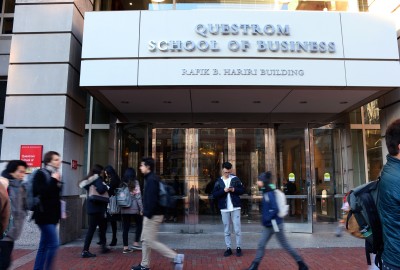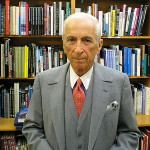
Boston University’s Questrom School of Business has partnered with CIO magazine to create the “Mini MBA for Tech Executives,” which equips the executives with the required fundamental business and management knowledge to survive in a rich technological landscape.
The four-day program will be offered twice, once in April and another later in September, during which seven BU faculty members will teach participants to master knowledge in areas of “accounting, finance strategy, marketing, operations and organization behavior,” according to the program’s website.
The program, offered through Questrom’s Executive Leadership Center, is a non-degree program. Instead, the program offers a certificate of completion at the end of the course, Questrom’s program and marketing manager Katherine Yunker said. Throughout the week, participants in the program will have a chance to enhance their portfolio while engaging in curriculum they might not be familiar with, Yunker added.
“This is something that people come to from a lot of different angles,” Yunker said. “Some people are actually considering an MBA program and want to use this to get their feet wet and maybe learn what an MBA could offer them, so that it is a more strategic position. Some people just do not have the time or financial resources to dedicate to an MBA program.”
Yunker said program attendees, specific to “rising technology leaders,” will be able to engage in classes and activities that highlight foundational skills future leaders need in order to transition into a graduate level course, as well as the workforce.
“We already have a more senior program,” Yunker said. “We thought we needed to complement that with a program that was really tackling the MBA discipline and the fundamentals of what an MBA offers.”
Yunker said attendees will gain valuable networking opportunities from the program in addition to the skills they learn in the classroom.
“It’s a global audience that attends, and a lot of people may be at your same level, have the same goals or career trajectory,” Yunker said. “There’s a lot of learning in the classroom from the professors, but also a lot of group work and small team work that helps to cross-pollinate ideas.”
Questrom has had a long-standing partnership with CIO, Yunker said. CIO is a resource magazine that provides detailed analysis of technology trends and highlights the ability of information technology to aid executives in achieving business objectives.
Several students said they would appreciate the opportunity to partake in a mini program before pursuing a degree.
Morgan Cope, a freshman in the College of Arts and Sciences, said she is in favor of an opportunity that would allow participants to see what an MBA program can offer.
“Personally, I am really bad at making decisions, so it’s nice to see what an MBA program could be like before you make a really big commitment,” Cope said. “It’s a great idea.”
Donna Heydar, a freshman in the College of General Studies, said the program could help bridge the gap between undergraduate and graduate levels of education.
“[The program] is a good way to dip your feet into the pool without making that jump all at once,” Heydar said. “It sounds pretty good to be able to have a transition and time to learn those skills.”
Pranati Rao, a sophomore in Questrom, expressed enthusiasm about the program and said it would make her feel more secure in her decision to pursue a master’s degree.
“A four-day program sounds pretty good because an MBA is a lot of money,” Pranati said. “So before you commit to that, you should know what you are putting yourself into. I’m actually in the business school as an undergrad and I want to get an MBA, so I would definitely like to do a program like this.”





Interested in the program
Send me details interested in the program